We’ve all seen movies where artificial intelligence (AI) becomes a part of everyday life by reinforcing our systems with machine learning and automation. While we’re not there (yet), artificial intelligence has made its way into our daily activities, spanning from casual Google searches to regulating streetlights on the road.
There are many tasks that we humans find either tedious or repetitive, making the advancement of AI somewhat welcoming. More and more businesses around the world are integrating AI into their systems, especially that of digital marketing, which relies heavily on an internet presence. In fact, marketers using AI in their efforts jumped from 29% in 2018 to 84% in 2020. One of the most used forms of online referral marketing is called affiliate marketing, in which a publisher (affiliate) advertises a product in return for sales commission.
With such a spike in affiliate marketing programs globally, it’s only natural to search for ways to optimize performance. This is where AI comes in, almost effortlessly easing into the digital marketing space. According to statistics, 61% of employees claimed that AI has assisted in improving their work productivity. In between all the marketing tools and other automated benefits, it’s hard to know where to begin and how to integrate AI into a marketing strategy. If you’re interested to know how AI can help your affiliate marketing techniques, keep on reading!
What is artificial intelligence (AI)?
Before we dive into the fine details of how artificial intelligence (AI) can improve our marketing techniques, it’s a good idea to cover what it is- in layman’s terms, of course.
The field of artificial intelligence is concerned with designing smart machines that can perform tasks that usually need human intelligence. There are a wide range of branches within this field, and that are often divided into categories and types depending on their strengths and capabilities. The two broad categories are narrow AI and general AI.

Narrow AI
Also referred to as “weak AI”. This category consists of AI that works in a limited context and is considered a simulation of human intelligence. Narrow AI typically performs one task very well. Examples include chatbots, facial recognition, and virtual assistants like the infamous Siri and Alexa.
Note that much of narrow AI is based on machine learning and deep learning. Machine learning inputs data into a computer and uses statistical methods to “learn” and improve at a certain task, without the need to be constantly programmed. Deep learning is a type of machine learning that inputs data through a multi-layered, and biologically inspired, neural network. By going “deep” into the data processing, connections are made through the neural network, weighing out the input for optimal results.
Strong AI
This is referred to as “Strong AI”, and is the artificial intelligence notoriously known in pop culture- Characters like VIKI (Virtual Interactive Kinetic Intelligence) from Isaac Asimov-based adaptation, I, Robot. Strong AI are machines with intelligence that can be applied to any situation. Apart from VIKI, other examples include Data from Star Trek and Pat from Smart House.
There are also four main types of AI
Reactive
This is the most basic type of AI machine, as it uses its intelligence to perceive and react to stimuli. There is no memory storage, so past memories do not influence decision-making. A great example of reactive AI are chess games, which are pre-programmed with limited and repeatable rules.
Limited memory
As in the name, this type of AI is able to store data and past predictions. By using the previous information, it can weigh out the decisions and, using past predictions, infer what may come next. It is more complex than reactive AI and is constantly fed new data in order to upgrade the machine learning process. Self-driving cars are an example of limited memory AI.

Theory of mind
This type of AI is considered the next level of artificial intelligence. While our technological advancements haven’t reached this level, the idea behind it is that the AI could understand the thought and emotional processes of humans, animals, and even other machines. Through this understanding, they could “feel” and make decisions of their own. Grasping the multidimensional concept of the “mind” and partaking in self-reflective behaviors are key here.
Self-awareness
This level of AI comes after Theory of Mind is grasped. Self-awareness would be the final step for AI to understand humanity, its own existence, and even have human levels of consciousness. This process, of course, requires humans themselves to understand human levels of consciousness to be able to program it into a machine, so we can leave this level of AI for the movies, and our far future.
Considering the types of AI, it’s safe to say that only two (reactive and limited memory) types are relevant when it comes to marketing techniques, especially that of affiliate marketing. So now, let’s take a closer look at this digital marketing strategy.
What are AI marketing tools?
As we all know, it’s essential for businesses to analyze high amounts of data on the go in order to make educated changes to their marketing strategy and campaigns. Spending unnecessary stretches of time guessing and taking a trial and error approach with their campaigns can sometimes be a make or break situation.
To combat these highly demanding processes, countless AI-powered marketing tools are being developed continuously. According to AI statistics, 40% of companies use AI tools, machine learning, and data analysis for their data quality issues. An AI-powered tool is a software or platform that utilizes AI technology to assist in analyzing data and making automated decisions. There are many variables that can be fed into the computer, especially with the use of annotation tools that help train different AI models.
This facilitates machine learning and optimizes marketing initiatives by providing data in the form of market trends, traffic data, and predictive information. Overall, the tools are meant to gather information in order to develop an optimal marketing strategy by highlighting factors that could give clues about the buyer’s trajectory. Implementing AI marketing automation into an affiliate marketing business increases the speed of analysis and, consequently, accelerates response time.
Since these processes are done without human intervention, the marketers themselves can devote time to other tasks, overall optimizing performance efficiency and eventually increasing affiliate income.
How does AI improve affiliate marketing strategies?
There is a wide range of AI marketing tools that can assist in different types of tasks when it comes to marketing. AI-powered tools can be helpful when analyzing bulk sets of data, analyzing information to construct creative assets, and even step in to write content when you experience spontaneous writer’s block. So how exactly does the AI actually improve affiliate marketing itself?
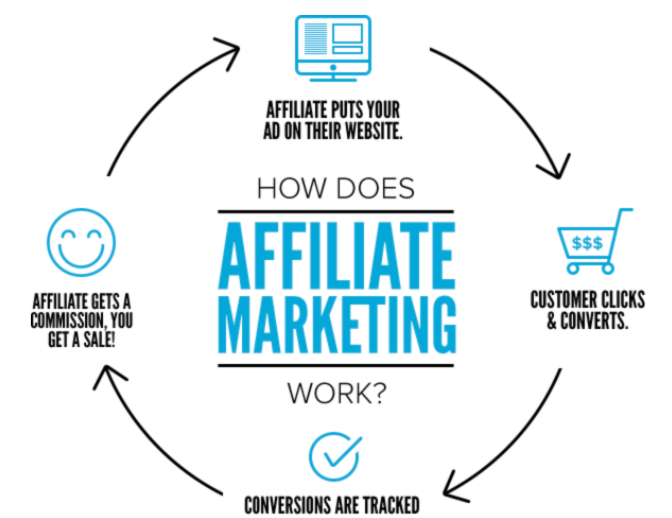
Saves time
The amount of tasks that require attention when running affiliate marketing campaigns can add up, costing many hours of work and effort over time. By investing in AI marketing tools to do time-consuming and repetitive tasks, you can allocate your marketing team to focus on other urgent or critical tasks. As a matter of fact, 73% of business decision-makers claimed AI allows humans to focus on other essential work. In many cases, utilizing AI-powered tools can save time by reducing the number of human errors. Lowering the number of mundane tasks requiring human interaction allows them to be more dedicated and concentrated on each one.
Automatic decisions
AI marketing tools can help a lot by automating decisions that are backed with data. After the whole process of collecting structured data, it can then analyze it and make an optimal decision in a split moment. This type of data includes trajectories of customer decisions, appropriate responses to emails during lead nurturing, or even reactive responses using chatbots. Veritably, businesses using AI claimed that 69% of their time towards data-related processing can be automated.
Content generation
In the vast expanse of digital marketing, we all know that content is king. Being able to consistently create valuable and engaging content is one of the main priorities for any business, as it increases the chances of getting qualified leads. AI powered tools are able to assist with that by lending a hand in content generation. Apart from creative assets, AI allows the consistent release of high-quality content at optimal times depending on the social media platform.
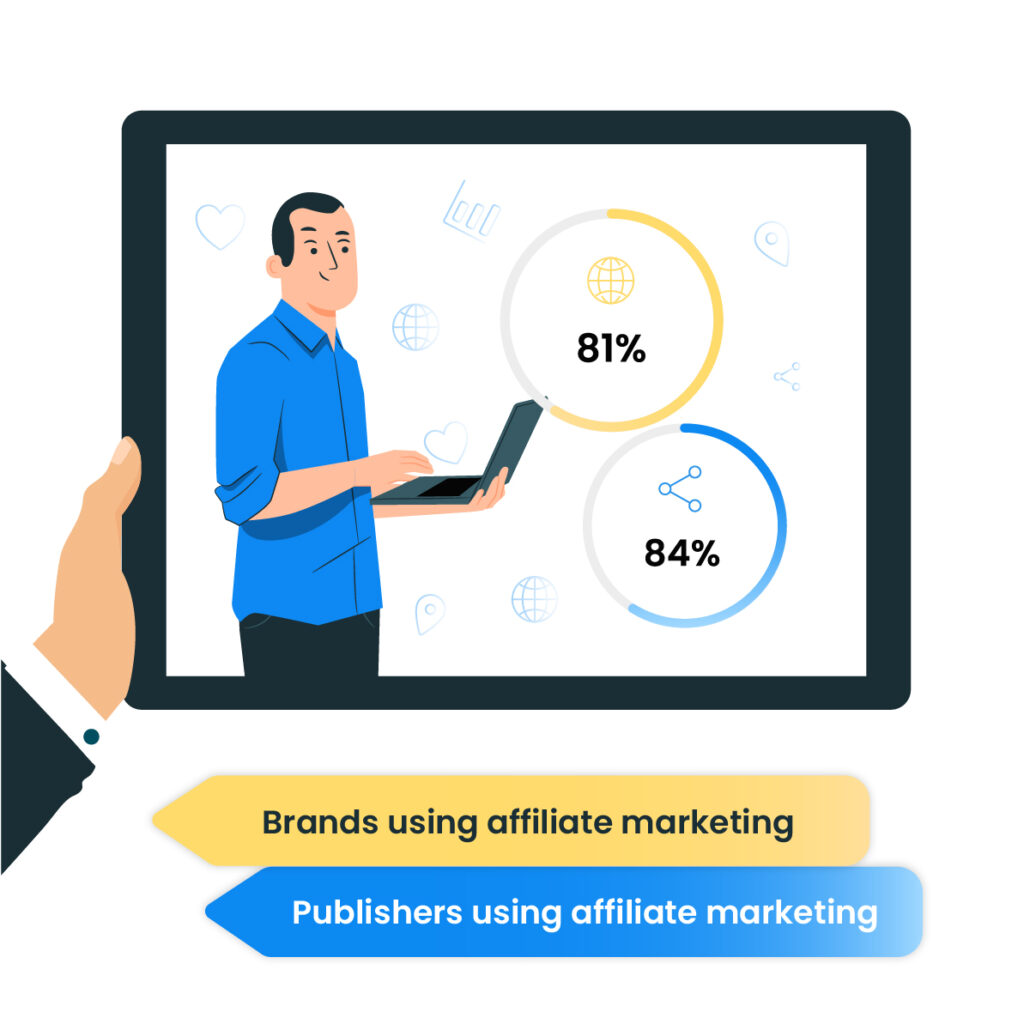
Structured data
When it comes to researching consumer behavior, AI is able to conduct meta-analyses and present structured data for marketing teams to use in their efforts. This type of information includes that of niches of prospective customers, popular keywords, and optimal algorithms for exposure. With this data, affiliate marketing efforts can be optimized for the right audience, as they can create their ideal buyer personas. Consistent analyses of data also allows marketing teams to see which factors are performing well or not, so they can continuously improve their campaign performance.
Increases lead generation
Putting effort into content optimization can increase lead generation. This includes making personalized content for your target audience, as well as tailored content for potential customers when they are already in your sales funnel. AI marketing tools can assist with lead nurturing methods, such as automated email drips, or automatic responses to certain questions on the page. Statistics show that businesses who use AI in their marketing efforts saw an increase of 50% in the number of leads they received. Helping qualified leads according to their needs can help increase conversion rates.
10 ways AI can improve your affiliate marketing strategy
Now that you’ve seen how artificial intelligence can impact your affiliate marketing strategy, it’s time to hone in on the different techniques you can use. AI-powered tools span from data analysis all the way to content creation, so it’s ideal to get to know their capabilities in order to select the ones you can incorporate into your marketing efforts seamlessly. Here are some ways that AI marketing tools can optimize your content and enhance your affiliate marketing strategy.
1. Keyword research
Keyword research is absolutely crucial when it comes to improving SEO scores and content optimization. By using relevant keywords in your title, meta description, and short/long-form content, you enhance your SEO score. This bumps your content up the rankings, making your business come up first on search engines. More than 25% of users click on the first page of search results. The higher your position is on the first page of results, the more organic traffic you drive to your business. Data shows the first five organic search results get approximately 67% of all clicks. There are many AI-powered tools that assist in generating optimal long-tail keywords. Using these keywords will not only generate organic traffic, but it will improve your content quality, which retains new potential customers on your page.
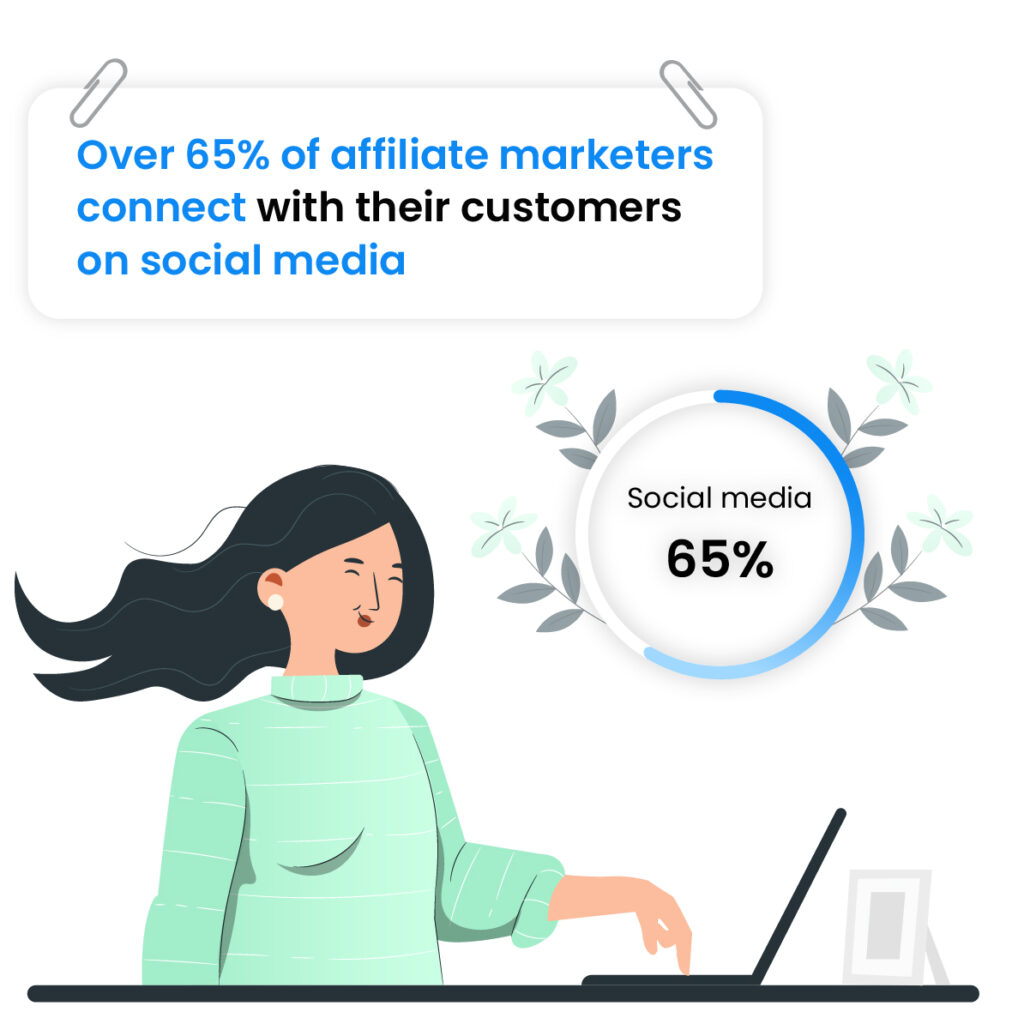
2. Personalized user experience
The way a user experiences your website influences their impression of your business. Striving for an overall positive and smooth user experience can make your business memorable. There are many ways to go about this, but the most common method is to understand consumer behavior so that your page experience can be personalized. AI marketing tools can analyze data about customer behavior, and respond by presenting appropriate and relevant content or offers. This data includes demographic information, location, and other variables.
The more you know about your prospective customers, the better you can personalize their user experience. 62% of consumers claimed they’re willing to use AI for a better experience. By adding AI-powered features, you can include elements like push notifications or chatbots, which can eventually also increase customer engagement on your page.
3. Chatbots
AI-powered chatbots are one of the most commonly used forms of AI-marketing, as they make the process of answering simple user questions much faster. This allows the time and effort of staff to be allocated elsewhere for more critical tasks. Having an AI-powered answer chatbot contributes to personalization of the user experience during their time on your page. Additionally, using chatbots for affiliate marketing can enhance engagement by promoting products or services directly to users based on their interactions and queries.
Surprisingly, 63% of users prefer to message a chatbot than a human when interacting with the business. Chatbots receive and analyze data, detect the problem, and deliver fast solutions to the user depending on their needs. Affiliate marketing with AI chatbots leverages these capabilities to provide tailored recommendations, boosting potential sales through dynamic and interactive communication. Statistics showed that the main benefits of using chatbots are:
- 24h service (64%)
- Instant inquiry responses (55%)
- Simple question responses (55%)
Using this type of AI-marketing tool adds to the reputation of your business, as it shows that you value the user’s time and want to provide solutions and answers as soon as possible.
4. Google Analytics
If you’re not using Google Analytics for your business, you’re missing out on a lot of valuable data that could elevate your marketing efforts. To put this into perspective, Google Analytics is used by 56% of all websites as of today. Google Analytics provides actionable insights, which is meaningful data that you can take action on. Examples include the volume of organic traffic, the amount of time spent on each page, how they got there, and other crucial variables. The data that this AI-powered tool provides covers information about your audience, customer acquisition, consumer behavior, and conversion rates. Utilizing every piece of information can contribute to the improvement of your affiliate marketing campaign’s performance, as well as the generation of quality leads.
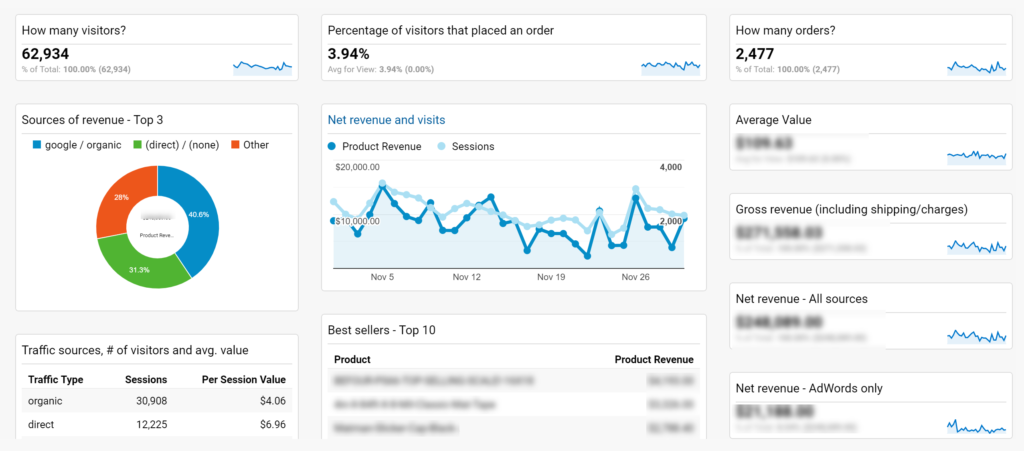
5. Creative content
You can boost your business’ content creation by utilizing the capabilities of AI-generated content. This type of content includes statistical infographics, market reports, or other generated summaries that are captivating for your customers. The benefit of using AI-generated content is that its style is consistent, and saves your business time in the long-run. Using the help of AI marketing tools allows you to create thorough and difficult content that would otherwise take time. This definitely overcomes the typical Writer’s block phenomena, while simultaneously optimizing original content. Blogs, interactive videos, and how-to guides are all examples of content that increases audience engagement.
6. Automate decision-making
AI can help with automating decisions by analyzing data and turning it into actionable insights. After gathering data from your marketing analytics or campaign performance, it determines the optimal response and executes it almost instantaneously. One of the many benefits of using these automation tools is the speed of which marketing decisions are made. Not only does AI assist in smart-decision making, but the execution is done without the need of human intervention. In a recent study, 72% of businesses that use AI trust it will make their jobs easier. Automated decision-making tools are mainly for tasks that require low levels of intelligence, or tasks that don’t involve complex problems.
7. Repetitive tasks
Having employees spend precious time on mundane and repetitive tasks is a time-killer, which is where narrow AI steps in to save the day. Since planning, arranging, and executing decisions takes such a huge amount of mental resources, AI marketing tools can empty your plate by doing the simple repetitive tasks. Easily programmable tasks such as sending welcome emails or organizing data sets are examples of things that AI tools can take care of. This leaves you to oversee other qualitative data (like responding to customer reviews) or human interactive tasks (follow-up calls to prospective customers).
8. Language processing
Natural language processing (NLP) is a type of artificial intelligence technology that has to do with language analytics. It takes insights from unstructured data (written or verbal responses from your customers) and runs analyses on it to extract information such as customer intentions, their motivations for the purchase, or their stage in the buying journey. All of this data is vital to your marketing efforts in order to improve their experience with your business.
Natural language processing can assist in content optimization, your branding efforts, and most importantly, lead generation. By understanding a qualitative set of data from your customers, you expand the amount of data that can be used towards improving your affiliate marketing strategies.
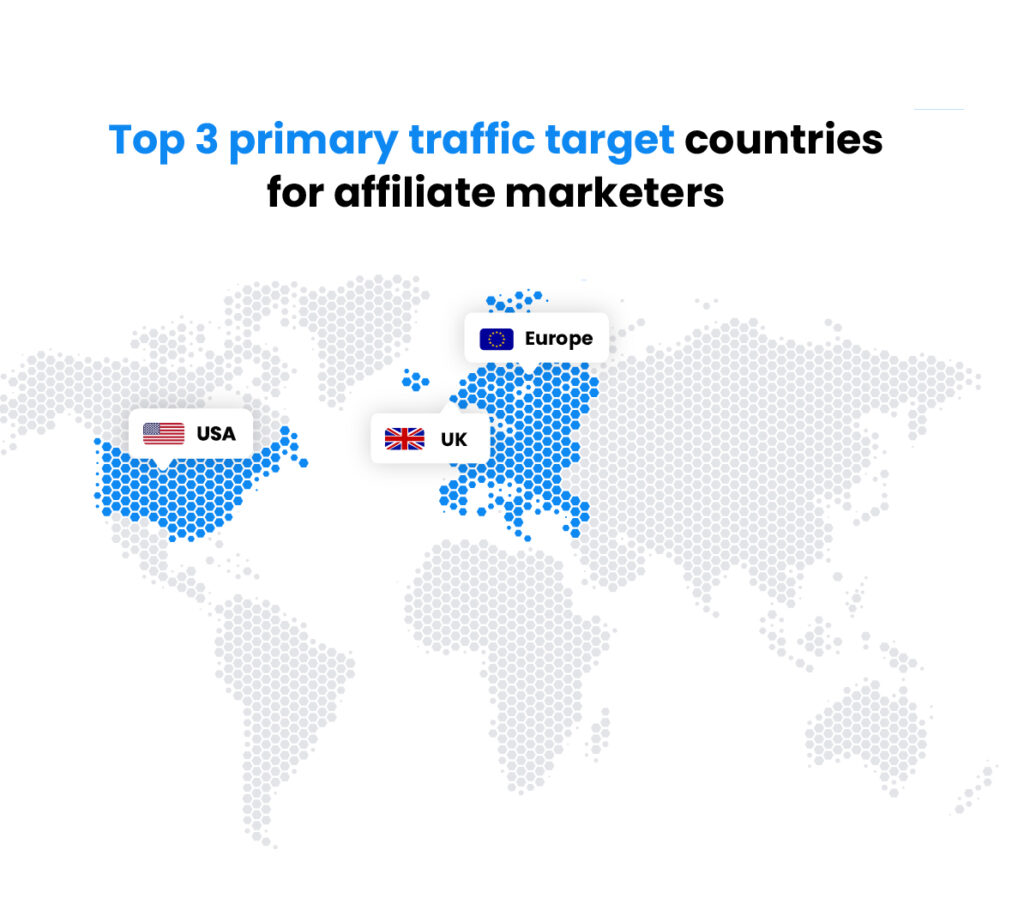
9. Email marketing automation
One upside to email marketing is that the users willingly gave their email address to receive content later. While this is absolutely not an invitation to spam, AI-powered tools can help gather insight and create relevant content for your customers depending on their stage in the buying journey. These emails can be automated and released using an email drip, which has shown effective results. Businesses who used email drip campaigns had a 20% increase in their overall sales.
AI tools can also analyze data such as the email open rate and click-through rates, providing you with more information to personalize content and increase your conversion rates. In fact, 87% of companies that implemented AI in their strategies used it to enhance email marketing. Be sure to add AI-generated keywords in the email subject in order to indicate the contents. Information relayed to customers should be relevant, helpful, and clear.
10. Fraud detection
Fraudulent traffic can cost businesses a lot of money in their marketing efforts, so detecting and preventing fraud is vital. In fact, recent statistics showed almost 70% of businesses whose marketing budget was at least $1 million experienced 20% of their budgets lost to fraud. AI-powered tools can use a machine learning algorithm to assist in detecting fraud by analyzing complex data sets. Risk behavior can be spotted, such as the numbers of connection attempts per hour or the speed of which forms are filled out.
AI can help monitor traffic quality and distinguish between organic traffic and fraudulent traffic. By implementing fraud-prevention tools, you increase internal security and simultaneously reduce the risk of loss.
What will incorporating AI do for your marketing strategy?
By incorporating AI into your marketing strategy, you automatically open up new avenues of automated help. Not only do you save time when it comes to tedious and repetitive tasks, but it adds to your overall brand’s reputation. These powerful tools boost customer experiences when it comes to their interaction with your page. Leaving potential customers with a positive and memorable impression is very important, and ultimately leads to better conversion rates and a higher ROI.
Generating personalized content is also vital to show your customers you understand them and are not just trying to spam them with irrelevant ads or information. AI marketing tools can assist with content creation that has a consistent style to it. Better branding, posting valuable content consistently, and driving organic traffic are all outcomes you can expect when incorporating AI into your affiliate marketing efforts.
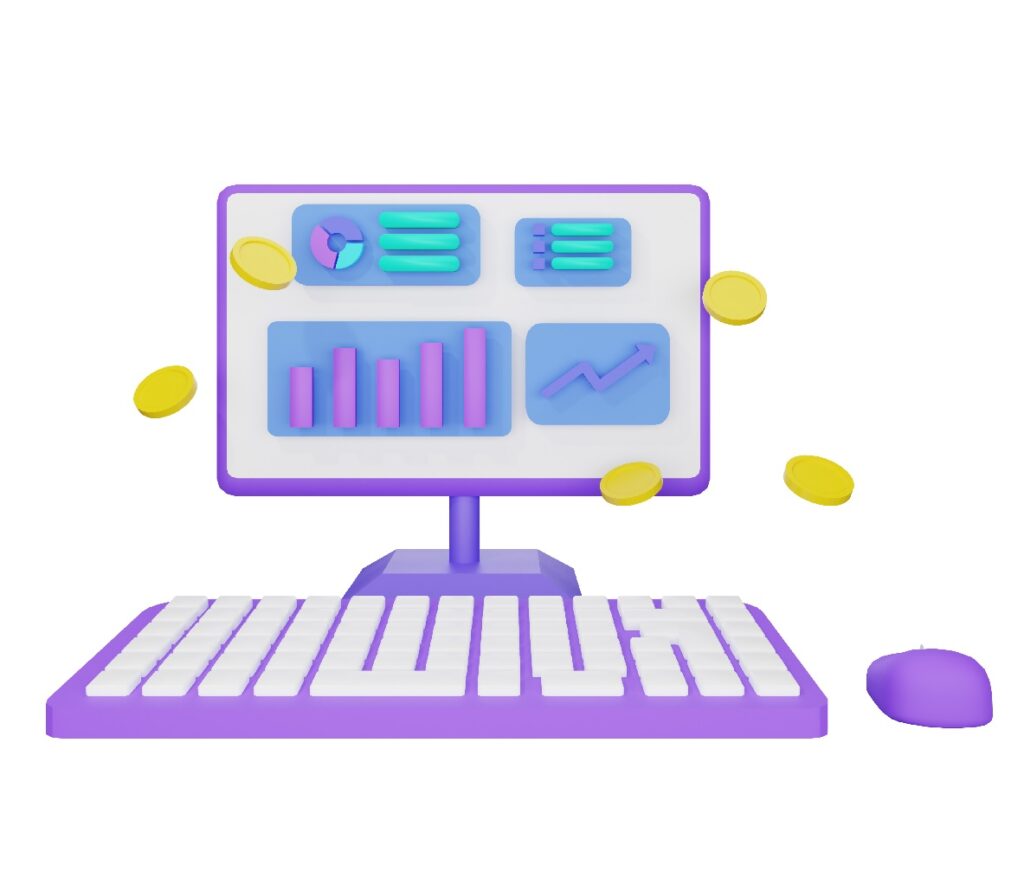
Conclusion
As our technology advances, affiliate marketing strategies are improved thanks to the development of AI-powered tools. Almost every aspect of business can be made more efficient, especially when it comes to repetitive tasks or automated decision-making. Utilizing Google Analytics to improve SEO and content optimization is one of the best things you can do to step up your marketing game.
On top of that, generating creative assets, analyzing actionable insights, and accelerating appropriate responses to customers all help in giving businesses a positive image. AI tools also enhance user experience and personalization, two very important factors that marketing teams strive to prioritize. After sifting through all the benefits that AI marketing tools can offer, it’s undeniable that incorporating these powerful tools will take your marketing techniques up a notch in both speed and efficiency.
There’s no doubt that artificial intelligence holds a key role in the future of marketing. Get your business in the express lane by integrating these tools into your marketing strategy and reap the rewards!
Frequently Asked Questions
What is artificial intelligence (AI)?
Artificial intelligence is the study of creating machines that can perform tasks that usually require human intelligence.
What are AI marketing tools?
Artificial intelligence (AI)-powered tools are software or platforms which use AI technology for analysis and decision-making.
What are some ways to incorporate AI into marketing strategies?
Some ways you can incorporate AI into marketing strategies are by using tools for keyword research, user personalization, marketing analytics, email automation and natural language processing.
How can AI improve affiliate marketing strategies?
AI can improve affiliate marketing strategies by automating decisions, generating content, gathering and analyzing structured data.
What will incorporating AI do for your business?
Incorporating AI into your business’ marketing strategies will improve quality lead generation, boost organic traffic drive, and ultimately increase ROI.
Share this article
The leader in Affiliate software
Post Affiliate Pro offers a comprehensive affiliate software platform to manage multiple affiliate programs with ease. Enjoy no setup fees, 24/7 customer support, and a free 1-month trial. Ideal for small and large businesses, it features precise tracking, automated workflows, and customizable tools to boost your affiliate marketing success. Try it now and streamline your affiliate operations effortlessly!
9 affiliate marketing tools that’ll help you run your affiliate program
Discover 9 essential tools to supercharge your affiliate marketing program! From visual content creation with Visme to comprehensive management with Post Affiliate Pro and audience insights via Smartlook, these tools will boost your sales and refine your strategy. Dive in to maximize your affiliate success!
Affiliate marketing email templates
Discover expertly crafted email templates for affiliate marketing with Post Affiliate Pro. Enhance your communication by motivating, acknowledging, and engaging affiliates effectively. From terms and conditions to product launches, these templates ensure clear and consistent messaging to boost your affiliate program's success. Visit now to streamline your affiliate communication!
Discover the essential role of affiliate software in managing and optimizing your affiliate marketing programs. Learn how it streamlines link tracking, referral management, and commission payments, ensuring data security and fraud prevention. Unlock growth opportunities with efficient program management and boost your business's reach and ROI. Visit now to explore the benefits of investing in affiliate software!
How To Find Affiliates to Sell Your Products
Discover over 10 successful strategies for finding high-quality affiliates in 2024 to boost your product sales. Learn to leverage influencers, join affiliate networks, and enhance your reach through SEO and social media. Maximize revenue with transparency and ongoing monitoring in your affiliate marketing program.
FlowHunt AI Chatbot Integration
Create AI chatbots effortlessly with FlowHunt's no-code platform. Free demo & support available. Enhance your affiliate marketing!














